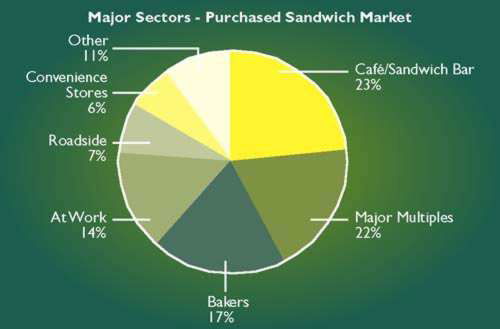Hazlewood Sandwiches
Greencore’s traditional activities lie at the start of the food production chain, whereas the new convenience foods operations are at the end of it, and include many products with high added-value.

Hazlewood Sandwiches is the largest company within Greencore’s Chilled Foods Division. It employs 3,000 people, of whom 2,000 work at Manton Wood and 650 work at the company’s Park Royal site that serves London and southern England. There are also 350 distribution staff employed in 15 depots across the UK. It’s a huge operation – every year the business uses 7 million loaves and 244 million prawns.
Hazlewood Sandwiches’ mission statement is: ‘to lead the UK chilled sandwich market‘.
The £25 million invested in the Worksop factory supports this mission by:
- providing modern facilities
- tripling production capacity compared with the previous site.
The sandwich market
A market comprises all the buyers and sellers of a particular product such as sandwiches or pizzas. Firms need to know the size of the market in which they compete. Market size is measured in two ways:
1. by value – e.g. total sales annually of £100 million for Product A
2. by volume – e.g. 1 million units of Product A sold each year.
Currently the UK sandwich market is worth £3 billion – representing 1.8 billion sandwiches – and is growing at around 6each year. Hazlewood Sandwiches is the world’s largest producer of sandwiches.
The pie chart shows the major sectors (retail suppliers) of the purchased sandwich market. For Hazlewood Sandwiches the major multiples (e.g. Asda, Safeway) provide an important and growing sector of that market.
The market continues to grow because:
- People’s lives are becoming busier, leaving them less time to prepare food. More women go out to work (about 50% of the labour force), and many of them have more than one job.
- People are taking shorter lunch breaks, leaving them less time for a midday meal.
- Many busy working people can now afford to pay others to make sandwiches for them – they are said to be ‘cash rich, time poor’.
- Sandwich quality has greatly improved, with interesting recipes designed to meet individual customer requirements.
- More people look for new types of sandwiches with ingredients that reflect what they have eaten when travelling abroad.

Investing in plant
To grow, organisations need to invest. They face many possible investment choices. Wise investment decision-making involves identifying investment opportunities that offer the best chance of a high return. The buoyant market for sandwiches offers worthwhile investment opportunities. The company has made two significant investments in sandwich manufacture.

1. In 1998 Hazlewood Foods purchased Breadwinner Sandwiches in London, with a production capacity of 1 million sandwiches per week.
2. Recently, Hazlewood Sandwiches has spent £25m to build Manton Wood in Worksop with a weekly production capacity of 3 million sandwiches: it currently produces 2 million. This factory is the world’s largest sandwich plant.
In business there are several ways to appraise or evaluate the value of any contemplated investment.
A comparatively straightforward method of investment appraisal is the payback method. This involves calculating the number of years it would take a project (e.g. Manton Wood) to pay back (in cash flows) the original investment outlay.
A second method is to find the Net Present Value (NPV) of a proposal. This takes account of the fact that the repayment of an investment is distorted by inflation over time (prices usually rise over time). It recognises, for example, that a £ possessed now is worth more to a business than a £ to be earned next year and in following years, and for two main reasons: that £’s existence is more certain (next year’s £ is less certain to be earned) and its purchasing power is likely to be higher because of price rises in the meantime. This method therefore calculates all cash flows in terms of today’s money (NPV) and compares these with the capital to be invested in the project.
A third method, the Accounting Rate of Return (ARR), looks at profits rather than cash flows and measures the rate of return on capital employed – the organisation will have a target figure in mind.
In deciding whether to invest in the project, financial controllers at Hazlewood Sandwiches calculated the likely profits from the new factory, using a profit and loss forecast. A simplified format of this is shown below:
Profit and loss forecast

Given the growing market and a tripling of production capacity, the company’s forecast was for a significant improvement in financial return which would generate a rise in ARR.
The company also anticipated that the average cost of each sandwich it produced would fall, because:
- The new factory offers a superior production flow line. Compared with the old factory, less labour would be required to move raw materials and finished stocks.
- Stock levels of inputs are reduced. Just-in-time delivery methods reduce stock wastage e.g. there are 3 bread deliveries daily.
- Stock levels of output are zero. Output leaves the factory immediately on completion.
As a result of the investment appraisal and profit and loss forecast, the Greencore Group Board of Directors was confident the new investment would be a success and approved it.
In making their decision the Board recognised that:
1. The financial projections were soundly based and met the company’s investment criteria.
2. The old factory’s limitations was holding back growth and losing opportunities for the company.
3. Direct customers (large retailers) wanted a supplier with more extensive state-of-the-art facilities.
4. Superior factory layout would improve efficiency e.g. higher volumes, faster production, fresher quality.
Investing in people
Many businesses see their workforce as their greatest asset and recognise that a highly motivated, intelligent, properly trained, committed workforce is best placed to deliver the best results.
Sandwich making remains labour intensive. Although machines butter the bread, and apply the mayonnaise almost all other ingredients are added by hand. So the workforce needs to be committed to the task. Commitment comes from two main sources:
- a belief in the worth of the product (and therefore the worth of the job)
- a feeling of being valued by the employer.
Businesses that get these two aspects right help not only their workforce but also themselves, because labour productivity remains high, absenteeism stays low, labour turnover is reduced, and recruitment costs fall.
Manton Wood offers an excellent working environment, and Hazlewood Sandwiches has introduced focused employee initiatives, including:
- An extensive induction programme designed to make new recruits feel part of the team.
- Opportunities for employees to take National Vocational Qualifications relevant to the food industry, so enabling them to progress and develop within the company.
- Flexible, family-friendly working practices e.g. a ‘mothers’ shift’ with working hours tailored around young mothers’ childcare needs and schooling arrangements.
- An on-site hairdresser, gymnasium, company shop, cash machine, state-of-the-art restaurant, IT training and a dry cleaning service.
Faced with a 5-mile move, 95of Hazlewood Sandwiches employees agreed to ‘stay on board’. The company has won ‘Investors in People’ status, a nationally recognised benchmark for companies that have demonstrated specified levels of employee care. Labour turnover has decreased by 50% following the move.

Investing in products
To stay ahead of the competition, firms need to monitor customer requirements, introduce new products and modify existing product lines. Hazlewood Marketing Department used customer research to establish the requirements of two customer groups:
1. direct customers: retailers
2. end customers: shoppers.
Hazlewood Sandwiches produces the well-known ‘Sutherland’ brand, and retailer brands for multiple retail customers including Boots, Asda, Safeway, Co-op, Somerfield, Sainsbury & Europa Stores, Esso, Texaco, Total. Retailer-branded sandwiches allow retailers to express their own particular brand values – through such aspects as healthy eating, quality packaging, brand labels, etc. Hazlewood Sandwiches works in partnership with its retail customers to produce specific sandwiches that are ideal for that particular retail outlet’s end customers – the consumers.
A team of account and development experts is attached to each of its major customers who work with the retailers to decide on new products, the distribution of existing products, packaging and many other details. In a growing, changing market, new products are continually coming on stream and old ones are modified or withdrawn.
Conclusion
Hazlewood Sandwiches operates in a highly competitive growing market, which it leads. To retain that lead, the company has an ongoing programme for investing in state-of-the-art plant, people and product development. In this way it gives customers and consumers better choice while providing higher returns to shareholders from increases in profits and higher rates of return on investment.
